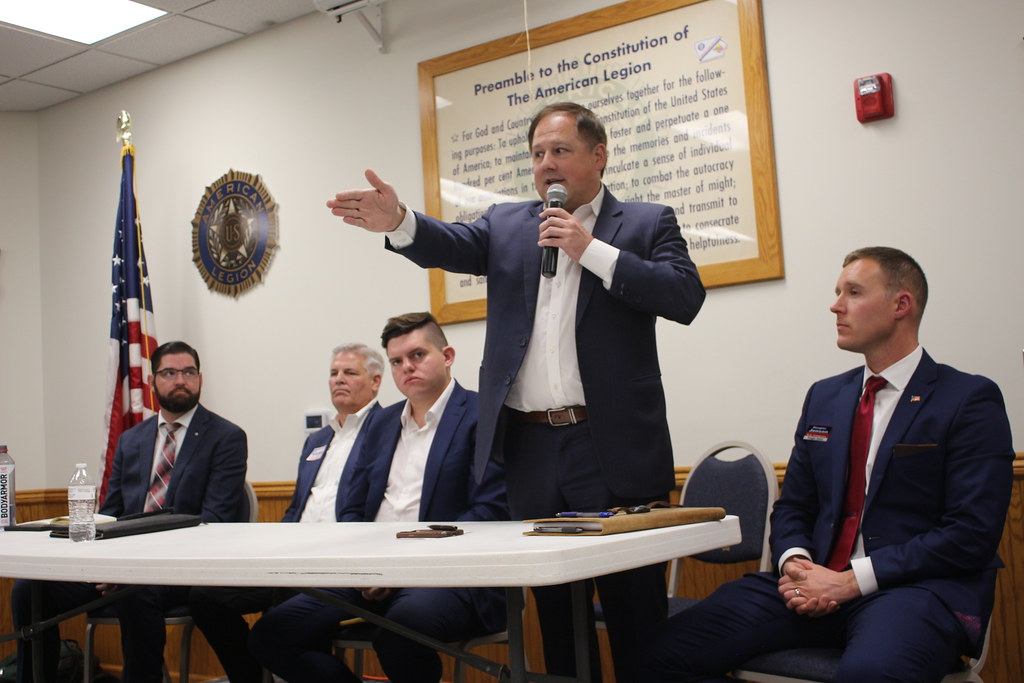The Iowa Faith & Freedom Coalition drew a packed house at the Treynor Community Center on Monday evening for its “Soapbox Speaker Series,” featuring five Republican candidates vying to represent Iowa’s Fourth Congressional District in the U.S. House.
The race gained momentum after incumbent Rep. Randy Feenstra announced his bid for governor, opening the seat due to Iowa’s “resign-to-run” rule for sitting candidates. Attendees included state legislators such as Reps. Brent Siegrist, Steve Holt, and Jon Dunwell, as well as Iowa state Sen. Mark Costello.
Moderated by Jeff Pitts, the forum emphasized faith, family, freedom, and fiscal responsibility as candidates tackled prepared questions, impromptu queries, and personal stump speeches.
Candidates introduced themselves in a three-minute stump speech round—order determined by a dice roll—before answering four pre-submitted questions on the national debt, pipelines and property rights, abortion, and how they differ from the rest of the field. A final round featured random, unseen questions on topics such as foreign policy, pet projects, gender ideology, faith, priorities, borders, agriculture, guns, legislative style, gridlock, and entitlements.
The Candidates and Their Standouts

Ryan Rhodes is a political consultant who started the Iowa Tea Party, worked on Dr. Ben Carson’s presidential campaign, helped launch Parler, and has supported conservatives such as Reps. Byron Donalds and Anna Paulina Luna. With the campaign slogan “Make America Iowa,” he appears to position himself as the MAGA candidate in the District 4 race. He praised Elon Musk and Dogecoin for challenging government waste, focused on border security and reshoring American jobs as matters of national security. He also framed abortion as part of a larger cultural battle.
“We have to look at the women who are being deceived. We have to cut off every dime of federal funding. We have to stand there and make sure life matters. Because the reason we’re talking about transgenderism and everything else … is because it started there, and too many people didn’t fight.”

Christian Schlaefer, a fifth-generation farmer, businessman, lay preacher, and homesteader from rural Iowa, warned that America stands at a crossroads. He highlighted shuttered storefronts and argued that Main Street and the American middle class must remain central to the nation’s future.
Schlaefer identified immigration as a foundational issue. “Immigration is a prerequisite for addressing all of these other things that we talk about. We talk about the budget and the monetary issue. Immigration is the most egregious area that we’re spending money.”
He specifically cited excessive spending on social programs such as Medicaid that he said go to non-citizens, as well as drug trafficking through unprotected borders.

Chris McGowan is a Sioux City economic development professional, former member of the Iowa Air National Guard, husband of 26 years, and father of six. He said he chose to study law in his mid-30s specifically to better understand the U.S. Constitution.
McGowan supports a Balanced Budget Amendment to address overspending in Washington, mirroring the one in Iowa’s state constitution. He cited his efforts to save Sioux City’s Poison Control Center and medical education programs and rejected the notion that Republicans are “heartless” regarding programs like Medicare and Medicaid.
“I reject the narrative of anyone who says the Republicans don’t care and are heartless… I have fought for health care on numerous fronts, and I will continue to do so.”

Matt Windschitl adopted “been there, done that” as his motto for the night. Having served in the Iowa Legislature for 19 years—now as Majority Leader—he noted the state’s political shift from a Democratic trifecta when he started to a Republican one today. He highlighted his experience in passing legislation and managing the state’s finances as evidence of his ability to help address the national debt.
“We’ve done it in Iowa. I’ve been part of that solution… by cutting spending, but also doing it in a way that works for all Iowans of every class.”
Sporting a pair of “2A” socks and describing himself as “the gun guy in the state legislature,” Windschitl named national reciprocity for concealed carry as his personal “pet project.”
“If you’re not a criminal, you should be able to carry a firearm regardless of what the state lines say—regardless of what some of the liberal states are saying.”

Douglas Jensen, a combat veteran who led troops in Afghanistan and air communications teams during the 2011 Libya crisis, positioned himself as the congressional “fixer.” He wrote his Ph.D. dissertation on congressional leadership—which he joked is often seen as an oxymoron—focused on how to get things done in a body of 535 “type A personality leaders.”
Jensen framed the national debt and recurring government shutdowns as symptoms of dysfunctional leadership. He called for a Balanced Budget Amendment, two-year appropriations cycles, and the codification of Kelo’s reversal to protect property rights.
“That’s my research—how do you do that, how to apply that, how to not get sucked into putting your party before your district? … And the answer is simple: focus on the people, put the people first, have town halls everywhere, listen to them. Always ask, what is on your mind? How can I serve you? That’s what I’m here to do.”
What to expect for the midterms
Moderator Jeff Pitts emphasized his desire to remain impartial and “simply allow the candidates to speak for themselves, and trust you all to sort it out.”
Iowa’s 4th Congressional District has long been considered a Republican stronghold, with incumbent Rep. Randy Feenstra winning previous elections by margins of 24–37 points. While the race remains rated as “Solid Republican” by major forecasters, three Democrats have declared their candidacies, including former Iowa House Rep. Dave Dawson, Stephanie Steiner, and Ashley Wolf-Tornabane.
The primary elections are scheduled for June 2, 2026, and the general election for November 3, 2026.

